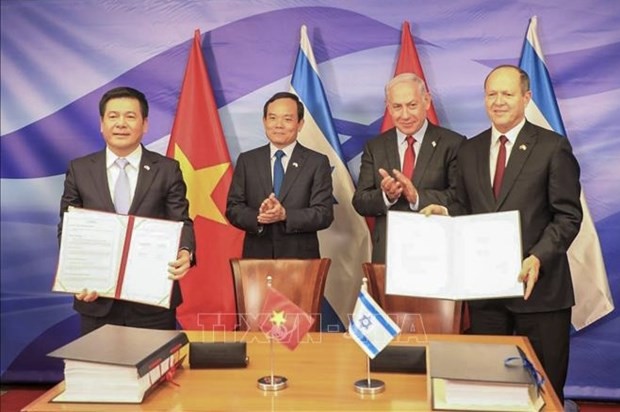
Vietnam, Israel sign Free Trade Agreement in Tel Aviv
Latest
 |
| Vietnam, Israel sign Free Trade Agreement in Tel Aviv: At the signing ceremony. (Photo: VNA) |
The two countries started negotiations for the agreement seven years ago and held 12 negotiation sessions. The agreement signing is even more meaningful in the context that the two countries are holding many practical activities to celebrate the 30th anniversary of the establishment of their diplomatic relations.
Notably, Israel is the first country in West Asia with which Vietnam has signed a free trade agreement (FTA) and Vietnam is also the first country in Southeast Asia that Israel has signed an FTA with.
Israel is currently one of the leading trade, investment, and labour cooperation partners of Vietnam in West Asia. The economic structure of Vietnam and Israel is complementary to each other, and the import and export products of the two countries do not compete directly but complement each other instead.
The signing and implementation of the VIFTA will create a favorable premise for Vietnam to promote the export of its goods to Israel, and at the same time have the opportunity to access Israeli high-tech products, contributing to reducing production and business costs and improving the competitiveness of Vietnamese goods.
The agreement consists of 15 chapters and several appendices about trade in goods, services - investment, rules of origin, technical barriers to trade (TBT), sanitary and phytosanitary measures (SPS), customs, trade remedies, government procurement, and legal – institutional framework.
With the agreed commitments, the two sides expect that two-way trade will have remarkable growth, reaching 3 billion USD and more soon. The agreement will ultimately remove duties on at least 86% of Vietnamese products and 93% of Israeli products, according to the Vietnamese Ministry of Industry and Trade.
VIFTA is also expected to be a lever to help strengthen the cooperation relationship between the two countries in investment, services, digital transformation, and technology.
In addition, the signing and implementation of VIFTA will create a favourable premise for Vietnam to promote the export of strong products not only to Israel but also to other markets in the Middle East, North Africa, and South Europe.
Meanwhile, besides Vietnam's market of over 100 million people, Israeli goods and technology will have opportunities to access markets in ASEAN countries, Asia-Pacific, and major economies which Vietnam has signed FTAs with.
VIFTA is expected to bring many opportunities for Israeli businesses when investing in Vietnam. Socially, such investment will help create more jobs in areas in that Israeli investors have interests and invest.





















